Hotel Handbook for Intercultural Competence
VerifiedAdded on 2023/01/09
|11
|3079
|75
AI Summary
This report provides a handbook for hotel employees on managing guest experience for international guests, addressing key cultural differences between UK and Japan, and the importance of cultural competence in the hospitality industry. It also includes a list of Do's and Don'ts for hotel staff to ensure effective customer service.
Contribute Materials
Your contribution can guide someone’s learning journey. Share your
documents today.
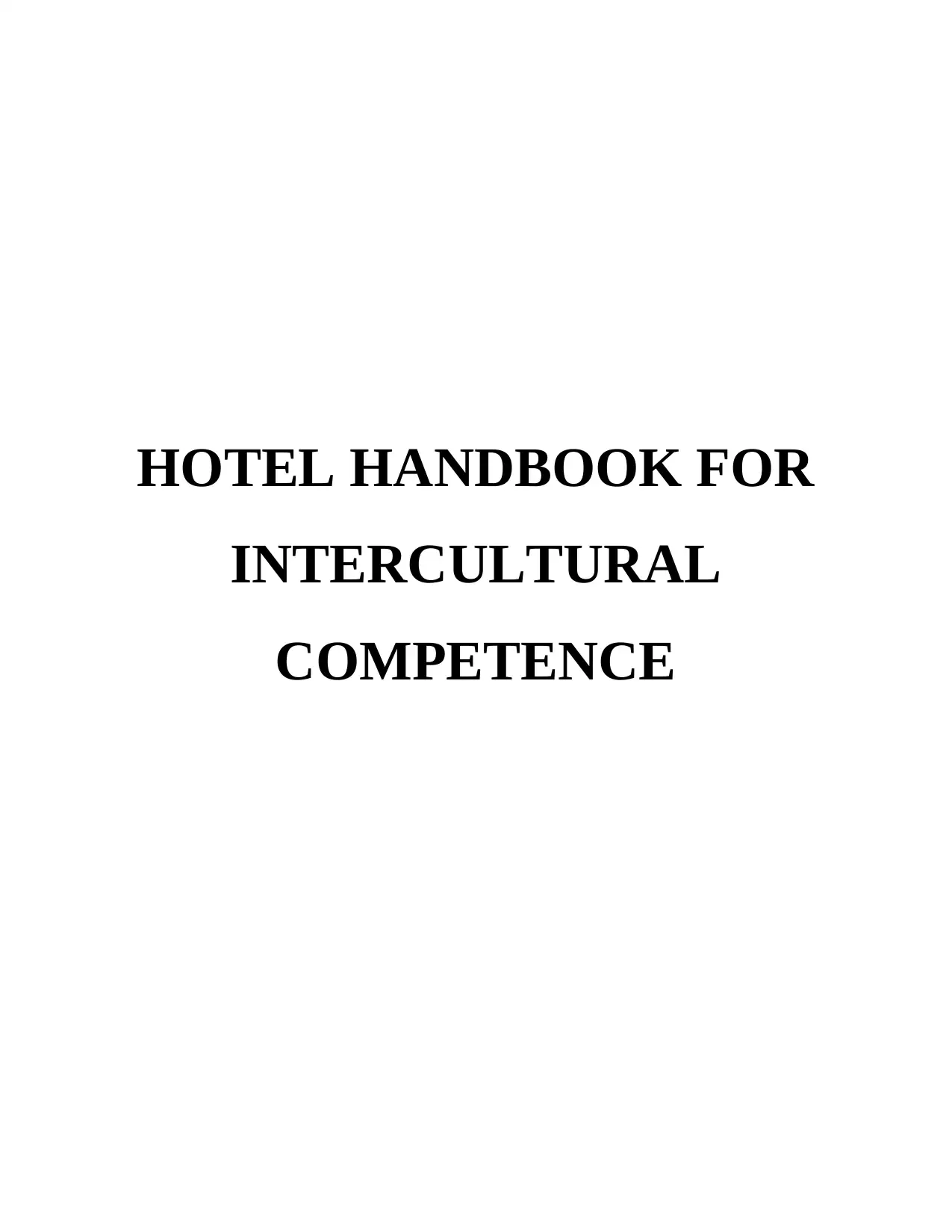
HOTEL HANDBOOK FOR
INTERCULTURAL
COMPETENCE
INTERCULTURAL
COMPETENCE
Secure Best Marks with AI Grader
Need help grading? Try our AI Grader for instant feedback on your assignments.
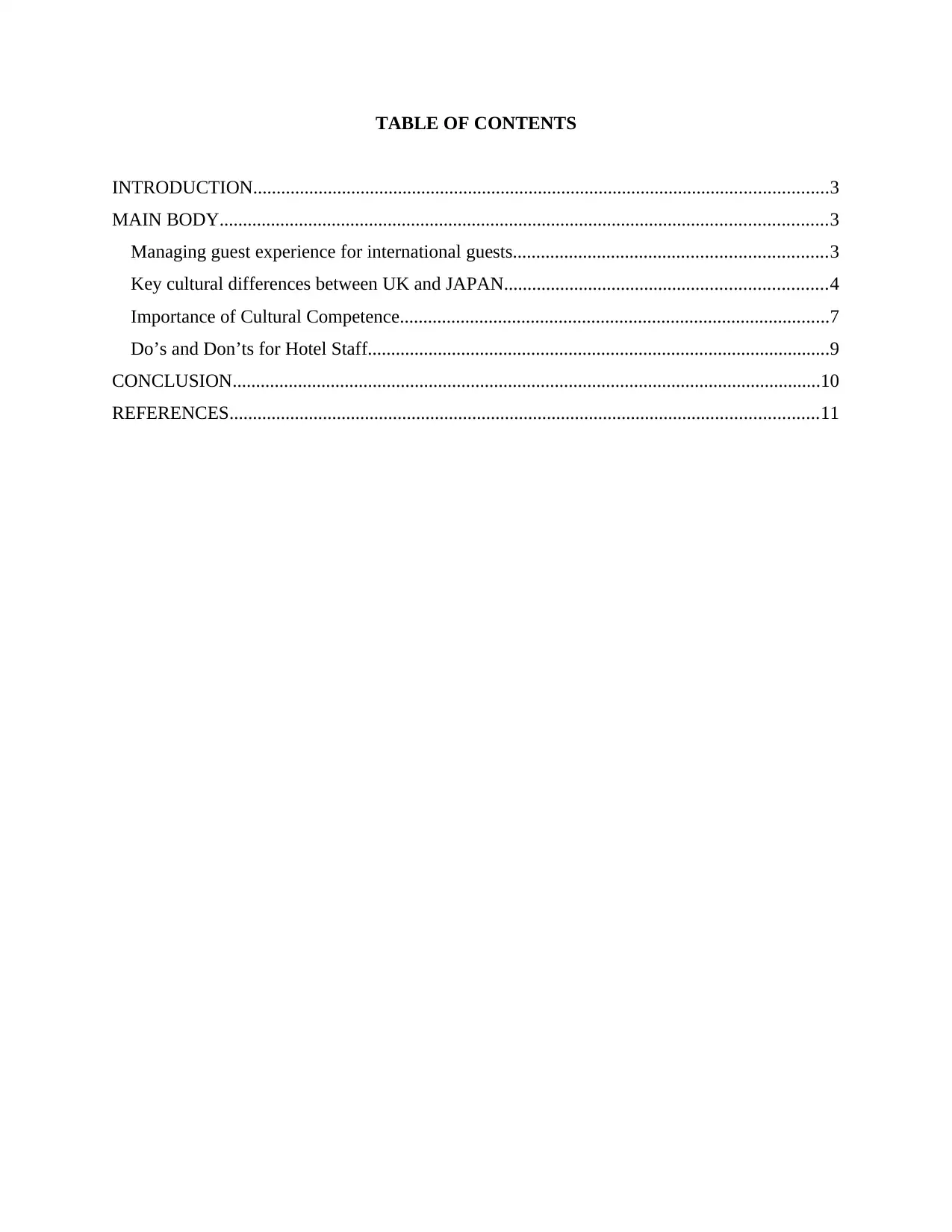
TABLE OF CONTENTS
INTRODUCTION...........................................................................................................................3
MAIN BODY..................................................................................................................................3
Managing guest experience for international guests...................................................................3
Key cultural differences between UK and JAPAN.....................................................................4
Importance of Cultural Competence............................................................................................7
Do’s and Don’ts for Hotel Staff...................................................................................................9
CONCLUSION..............................................................................................................................10
REFERENCES..............................................................................................................................11
INTRODUCTION...........................................................................................................................3
MAIN BODY..................................................................................................................................3
Managing guest experience for international guests...................................................................3
Key cultural differences between UK and JAPAN.....................................................................4
Importance of Cultural Competence............................................................................................7
Do’s and Don’ts for Hotel Staff...................................................................................................9
CONCLUSION..............................................................................................................................10
REFERENCES..............................................................................................................................11
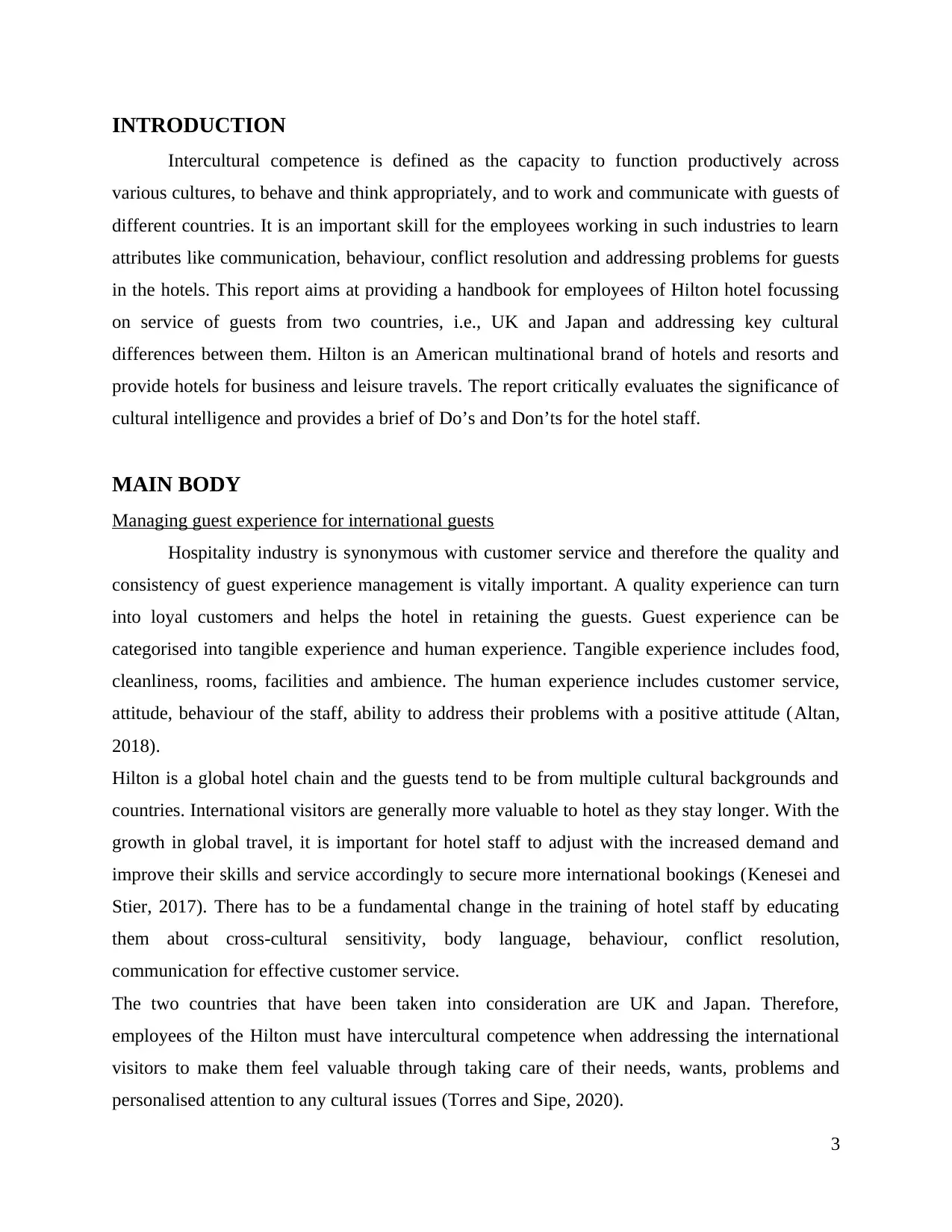
INTRODUCTION
Intercultural competence is defined as the capacity to function productively across
various cultures, to behave and think appropriately, and to work and communicate with guests of
different countries. It is an important skill for the employees working in such industries to learn
attributes like communication, behaviour, conflict resolution and addressing problems for guests
in the hotels. This report aims at providing a handbook for employees of Hilton hotel focussing
on service of guests from two countries, i.e., UK and Japan and addressing key cultural
differences between them. Hilton is an American multinational brand of hotels and resorts and
provide hotels for business and leisure travels. The report critically evaluates the significance of
cultural intelligence and provides a brief of Do’s and Don’ts for the hotel staff.
MAIN BODY
Managing guest experience for international guests
Hospitality industry is synonymous with customer service and therefore the quality and
consistency of guest experience management is vitally important. A quality experience can turn
into loyal customers and helps the hotel in retaining the guests. Guest experience can be
categorised into tangible experience and human experience. Tangible experience includes food,
cleanliness, rooms, facilities and ambience. The human experience includes customer service,
attitude, behaviour of the staff, ability to address their problems with a positive attitude (Altan,
2018).
Hilton is a global hotel chain and the guests tend to be from multiple cultural backgrounds and
countries. International visitors are generally more valuable to hotel as they stay longer. With the
growth in global travel, it is important for hotel staff to adjust with the increased demand and
improve their skills and service accordingly to secure more international bookings (Kenesei and
Stier, 2017). There has to be a fundamental change in the training of hotel staff by educating
them about cross-cultural sensitivity, body language, behaviour, conflict resolution,
communication for effective customer service.
The two countries that have been taken into consideration are UK and Japan. Therefore,
employees of the Hilton must have intercultural competence when addressing the international
visitors to make them feel valuable through taking care of their needs, wants, problems and
personalised attention to any cultural issues (Torres and Sipe, 2020).
3
Intercultural competence is defined as the capacity to function productively across
various cultures, to behave and think appropriately, and to work and communicate with guests of
different countries. It is an important skill for the employees working in such industries to learn
attributes like communication, behaviour, conflict resolution and addressing problems for guests
in the hotels. This report aims at providing a handbook for employees of Hilton hotel focussing
on service of guests from two countries, i.e., UK and Japan and addressing key cultural
differences between them. Hilton is an American multinational brand of hotels and resorts and
provide hotels for business and leisure travels. The report critically evaluates the significance of
cultural intelligence and provides a brief of Do’s and Don’ts for the hotel staff.
MAIN BODY
Managing guest experience for international guests
Hospitality industry is synonymous with customer service and therefore the quality and
consistency of guest experience management is vitally important. A quality experience can turn
into loyal customers and helps the hotel in retaining the guests. Guest experience can be
categorised into tangible experience and human experience. Tangible experience includes food,
cleanliness, rooms, facilities and ambience. The human experience includes customer service,
attitude, behaviour of the staff, ability to address their problems with a positive attitude (Altan,
2018).
Hilton is a global hotel chain and the guests tend to be from multiple cultural backgrounds and
countries. International visitors are generally more valuable to hotel as they stay longer. With the
growth in global travel, it is important for hotel staff to adjust with the increased demand and
improve their skills and service accordingly to secure more international bookings (Kenesei and
Stier, 2017). There has to be a fundamental change in the training of hotel staff by educating
them about cross-cultural sensitivity, body language, behaviour, conflict resolution,
communication for effective customer service.
The two countries that have been taken into consideration are UK and Japan. Therefore,
employees of the Hilton must have intercultural competence when addressing the international
visitors to make them feel valuable through taking care of their needs, wants, problems and
personalised attention to any cultural issues (Torres and Sipe, 2020).
3
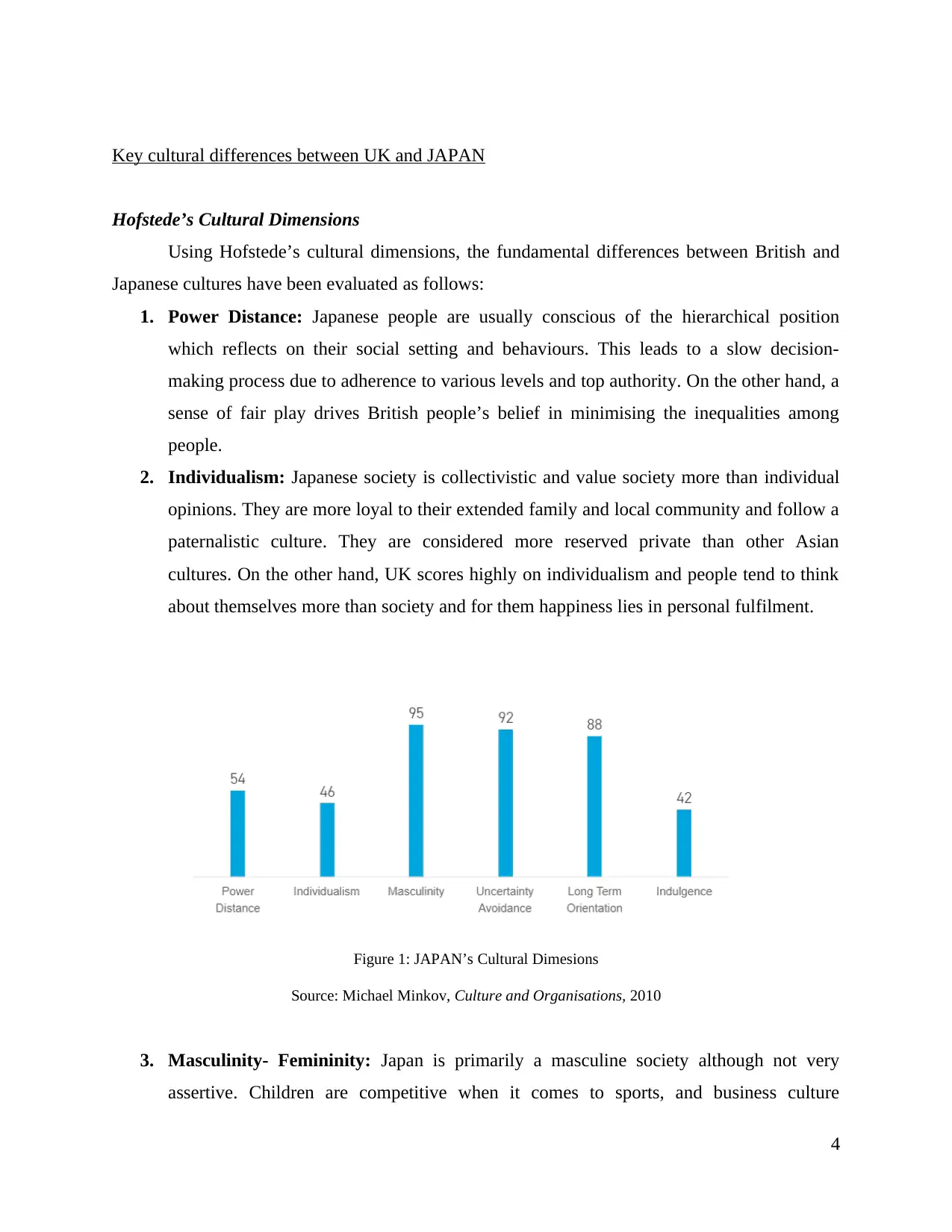
Key cultural differences between UK and JAPAN
Hofstede’s Cultural Dimensions
Using Hofstede’s cultural dimensions, the fundamental differences between British and
Japanese cultures have been evaluated as follows:
1. Power Distance: Japanese people are usually conscious of the hierarchical position
which reflects on their social setting and behaviours. This leads to a slow decision-
making process due to adherence to various levels and top authority. On the other hand, a
sense of fair play drives British people’s belief in minimising the inequalities among
people.
2. Individualism: Japanese society is collectivistic and value society more than individual
opinions. They are more loyal to their extended family and local community and follow a
paternalistic culture. They are considered more reserved private than other Asian
cultures. On the other hand, UK scores highly on individualism and people tend to think
about themselves more than society and for them happiness lies in personal fulfilment.
Figure 1: JAPAN’s Cultural Dimesions
Source: Michael Minkov, Culture and Organisations, 2010
3. Masculinity- Femininity: Japan is primarily a masculine society although not very
assertive. Children are competitive when it comes to sports, and business culture
4
Hofstede’s Cultural Dimensions
Using Hofstede’s cultural dimensions, the fundamental differences between British and
Japanese cultures have been evaluated as follows:
1. Power Distance: Japanese people are usually conscious of the hierarchical position
which reflects on their social setting and behaviours. This leads to a slow decision-
making process due to adherence to various levels and top authority. On the other hand, a
sense of fair play drives British people’s belief in minimising the inequalities among
people.
2. Individualism: Japanese society is collectivistic and value society more than individual
opinions. They are more loyal to their extended family and local community and follow a
paternalistic culture. They are considered more reserved private than other Asian
cultures. On the other hand, UK scores highly on individualism and people tend to think
about themselves more than society and for them happiness lies in personal fulfilment.
Figure 1: JAPAN’s Cultural Dimesions
Source: Michael Minkov, Culture and Organisations, 2010
3. Masculinity- Femininity: Japan is primarily a masculine society although not very
assertive. Children are competitive when it comes to sports, and business culture
4
Secure Best Marks with AI Grader
Need help grading? Try our AI Grader for instant feedback on your assignments.
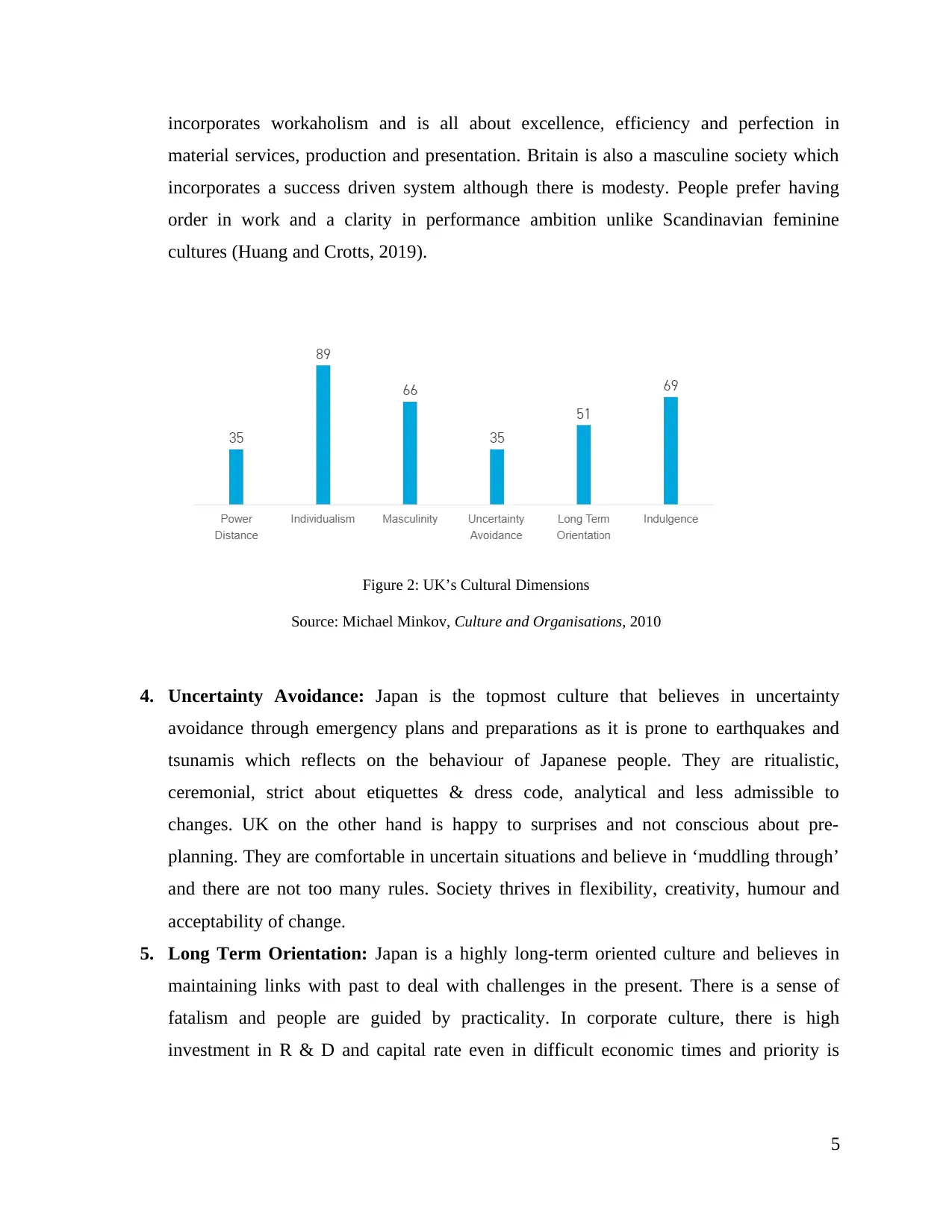
incorporates workaholism and is all about excellence, efficiency and perfection in
material services, production and presentation. Britain is also a masculine society which
incorporates a success driven system although there is modesty. People prefer having
order in work and a clarity in performance ambition unlike Scandinavian feminine
cultures (Huang and Crotts, 2019).
Figure 2: UK’s Cultural Dimensions
Source: Michael Minkov, Culture and Organisations, 2010
4. Uncertainty Avoidance: Japan is the topmost culture that believes in uncertainty
avoidance through emergency plans and preparations as it is prone to earthquakes and
tsunamis which reflects on the behaviour of Japanese people. They are ritualistic,
ceremonial, strict about etiquettes & dress code, analytical and less admissible to
changes. UK on the other hand is happy to surprises and not conscious about pre-
planning. They are comfortable in uncertain situations and believe in ‘muddling through’
and there are not too many rules. Society thrives in flexibility, creativity, humour and
acceptability of change.
5. Long Term Orientation: Japan is a highly long-term oriented culture and believes in
maintaining links with past to deal with challenges in the present. There is a sense of
fatalism and people are guided by practicality. In corporate culture, there is high
investment in R & D and capital rate even in difficult economic times and priority is
5
material services, production and presentation. Britain is also a masculine society which
incorporates a success driven system although there is modesty. People prefer having
order in work and a clarity in performance ambition unlike Scandinavian feminine
cultures (Huang and Crotts, 2019).
Figure 2: UK’s Cultural Dimensions
Source: Michael Minkov, Culture and Organisations, 2010
4. Uncertainty Avoidance: Japan is the topmost culture that believes in uncertainty
avoidance through emergency plans and preparations as it is prone to earthquakes and
tsunamis which reflects on the behaviour of Japanese people. They are ritualistic,
ceremonial, strict about etiquettes & dress code, analytical and less admissible to
changes. UK on the other hand is happy to surprises and not conscious about pre-
planning. They are comfortable in uncertain situations and believe in ‘muddling through’
and there are not too many rules. Society thrives in flexibility, creativity, humour and
acceptability of change.
5. Long Term Orientation: Japan is a highly long-term oriented culture and believes in
maintaining links with past to deal with challenges in the present. There is a sense of
fatalism and people are guided by practicality. In corporate culture, there is high
investment in R & D and capital rate even in difficult economic times and priority is
5
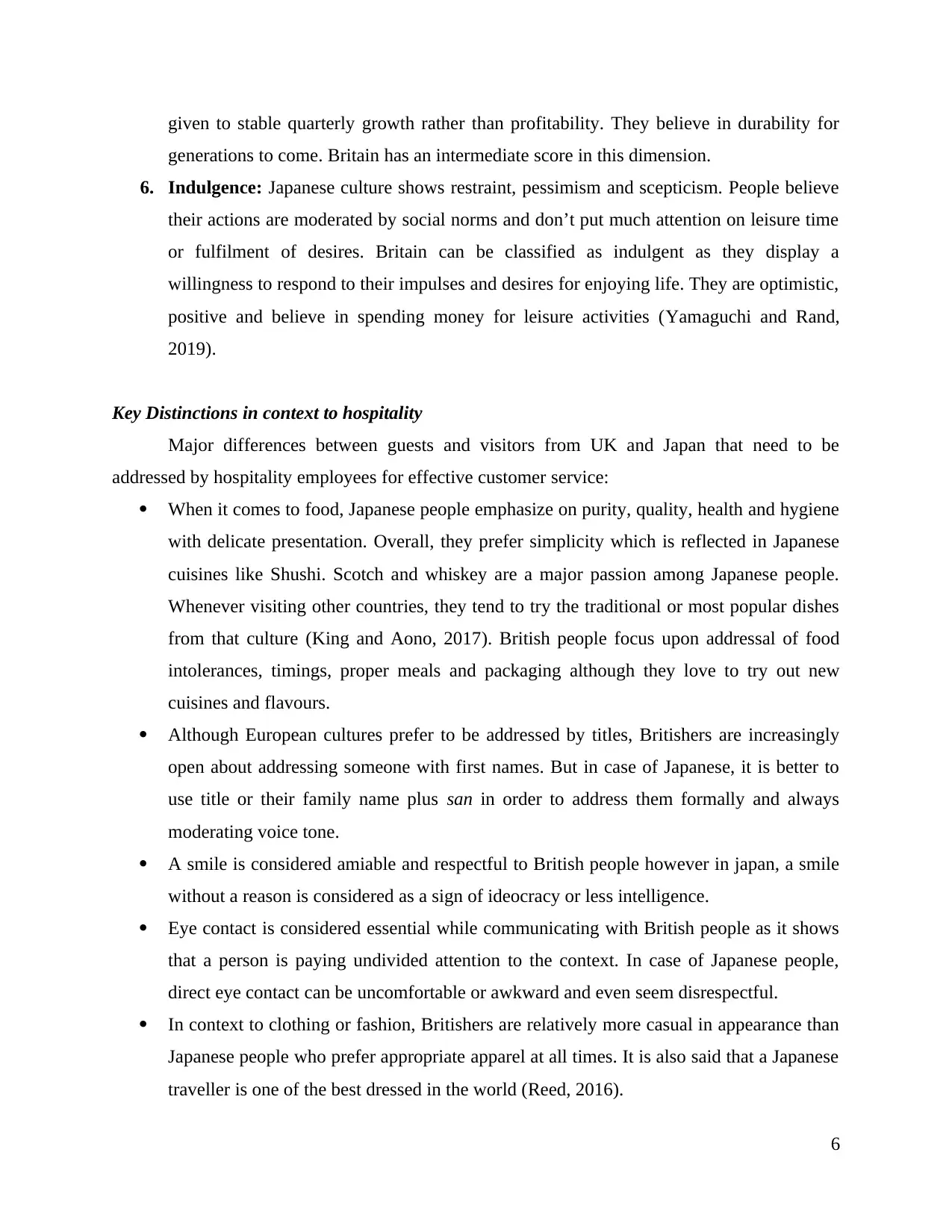
given to stable quarterly growth rather than profitability. They believe in durability for
generations to come. Britain has an intermediate score in this dimension.
6. Indulgence: Japanese culture shows restraint, pessimism and scepticism. People believe
their actions are moderated by social norms and don’t put much attention on leisure time
or fulfilment of desires. Britain can be classified as indulgent as they display a
willingness to respond to their impulses and desires for enjoying life. They are optimistic,
positive and believe in spending money for leisure activities (Yamaguchi and Rand,
2019).
Key Distinctions in context to hospitality
Major differences between guests and visitors from UK and Japan that need to be
addressed by hospitality employees for effective customer service:
When it comes to food, Japanese people emphasize on purity, quality, health and hygiene
with delicate presentation. Overall, they prefer simplicity which is reflected in Japanese
cuisines like Shushi. Scotch and whiskey are a major passion among Japanese people.
Whenever visiting other countries, they tend to try the traditional or most popular dishes
from that culture (King and Aono, 2017). British people focus upon addressal of food
intolerances, timings, proper meals and packaging although they love to try out new
cuisines and flavours.
Although European cultures prefer to be addressed by titles, Britishers are increasingly
open about addressing someone with first names. But in case of Japanese, it is better to
use title or their family name plus san in order to address them formally and always
moderating voice tone.
A smile is considered amiable and respectful to British people however in japan, a smile
without a reason is considered as a sign of ideocracy or less intelligence.
Eye contact is considered essential while communicating with British people as it shows
that a person is paying undivided attention to the context. In case of Japanese people,
direct eye contact can be uncomfortable or awkward and even seem disrespectful.
In context to clothing or fashion, Britishers are relatively more casual in appearance than
Japanese people who prefer appropriate apparel at all times. It is also said that a Japanese
traveller is one of the best dressed in the world (Reed, 2016).
6
generations to come. Britain has an intermediate score in this dimension.
6. Indulgence: Japanese culture shows restraint, pessimism and scepticism. People believe
their actions are moderated by social norms and don’t put much attention on leisure time
or fulfilment of desires. Britain can be classified as indulgent as they display a
willingness to respond to their impulses and desires for enjoying life. They are optimistic,
positive and believe in spending money for leisure activities (Yamaguchi and Rand,
2019).
Key Distinctions in context to hospitality
Major differences between guests and visitors from UK and Japan that need to be
addressed by hospitality employees for effective customer service:
When it comes to food, Japanese people emphasize on purity, quality, health and hygiene
with delicate presentation. Overall, they prefer simplicity which is reflected in Japanese
cuisines like Shushi. Scotch and whiskey are a major passion among Japanese people.
Whenever visiting other countries, they tend to try the traditional or most popular dishes
from that culture (King and Aono, 2017). British people focus upon addressal of food
intolerances, timings, proper meals and packaging although they love to try out new
cuisines and flavours.
Although European cultures prefer to be addressed by titles, Britishers are increasingly
open about addressing someone with first names. But in case of Japanese, it is better to
use title or their family name plus san in order to address them formally and always
moderating voice tone.
A smile is considered amiable and respectful to British people however in japan, a smile
without a reason is considered as a sign of ideocracy or less intelligence.
Eye contact is considered essential while communicating with British people as it shows
that a person is paying undivided attention to the context. In case of Japanese people,
direct eye contact can be uncomfortable or awkward and even seem disrespectful.
In context to clothing or fashion, Britishers are relatively more casual in appearance than
Japanese people who prefer appropriate apparel at all times. It is also said that a Japanese
traveller is one of the best dressed in the world (Reed, 2016).
6
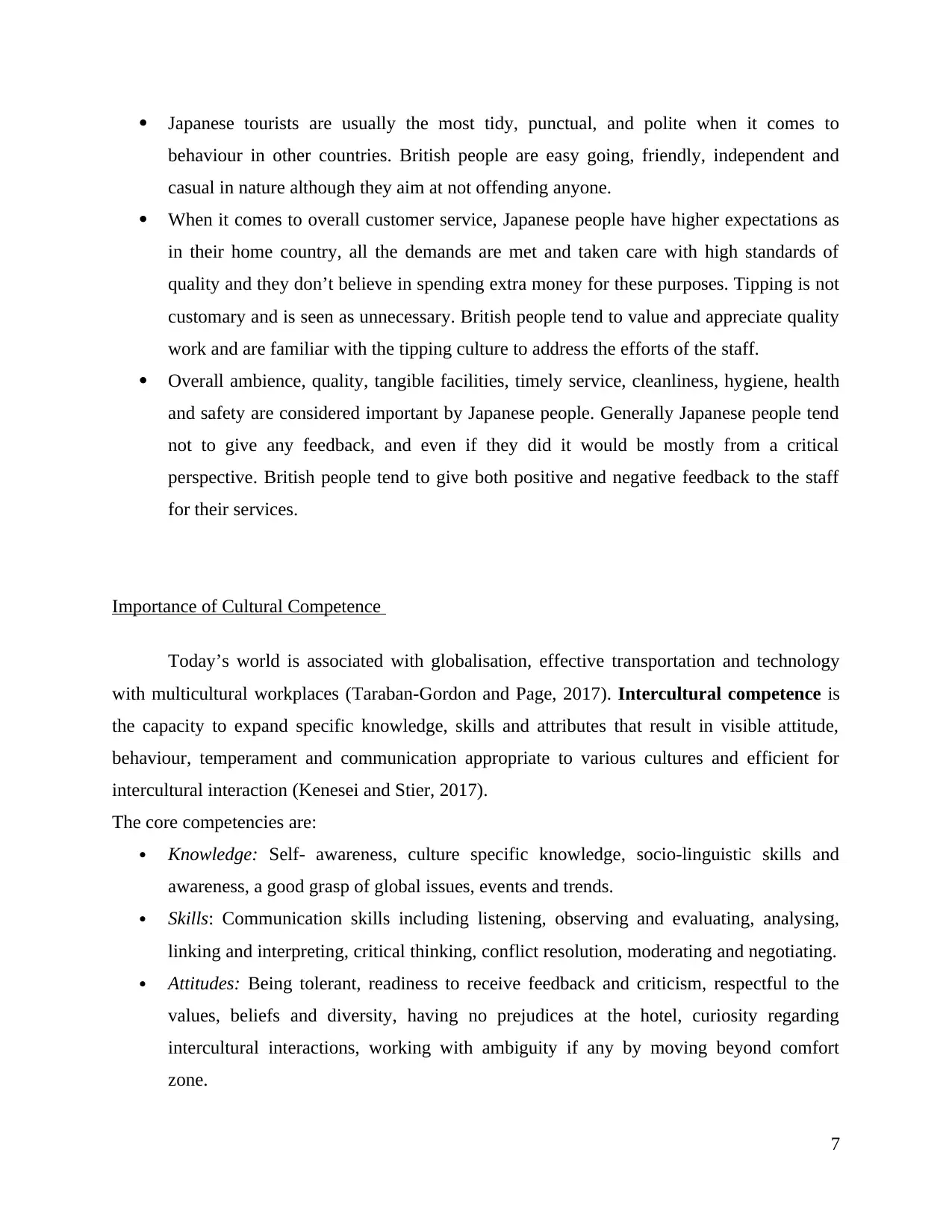
Japanese tourists are usually the most tidy, punctual, and polite when it comes to
behaviour in other countries. British people are easy going, friendly, independent and
casual in nature although they aim at not offending anyone.
When it comes to overall customer service, Japanese people have higher expectations as
in their home country, all the demands are met and taken care with high standards of
quality and they don’t believe in spending extra money for these purposes. Tipping is not
customary and is seen as unnecessary. British people tend to value and appreciate quality
work and are familiar with the tipping culture to address the efforts of the staff.
Overall ambience, quality, tangible facilities, timely service, cleanliness, hygiene, health
and safety are considered important by Japanese people. Generally Japanese people tend
not to give any feedback, and even if they did it would be mostly from a critical
perspective. British people tend to give both positive and negative feedback to the staff
for their services.
Importance of Cultural Competence
Today’s world is associated with globalisation, effective transportation and technology
with multicultural workplaces (Taraban-Gordon and Page, 2017). Intercultural competence is
the capacity to expand specific knowledge, skills and attributes that result in visible attitude,
behaviour, temperament and communication appropriate to various cultures and efficient for
intercultural interaction (Kenesei and Stier, 2017).
The core competencies are:
Knowledge: Self- awareness, culture specific knowledge, socio-linguistic skills and
awareness, a good grasp of global issues, events and trends.
Skills: Communication skills including listening, observing and evaluating, analysing,
linking and interpreting, critical thinking, conflict resolution, moderating and negotiating.
Attitudes: Being tolerant, readiness to receive feedback and criticism, respectful to the
values, beliefs and diversity, having no prejudices at the hotel, curiosity regarding
intercultural interactions, working with ambiguity if any by moving beyond comfort
zone.
7
behaviour in other countries. British people are easy going, friendly, independent and
casual in nature although they aim at not offending anyone.
When it comes to overall customer service, Japanese people have higher expectations as
in their home country, all the demands are met and taken care with high standards of
quality and they don’t believe in spending extra money for these purposes. Tipping is not
customary and is seen as unnecessary. British people tend to value and appreciate quality
work and are familiar with the tipping culture to address the efforts of the staff.
Overall ambience, quality, tangible facilities, timely service, cleanliness, hygiene, health
and safety are considered important by Japanese people. Generally Japanese people tend
not to give any feedback, and even if they did it would be mostly from a critical
perspective. British people tend to give both positive and negative feedback to the staff
for their services.
Importance of Cultural Competence
Today’s world is associated with globalisation, effective transportation and technology
with multicultural workplaces (Taraban-Gordon and Page, 2017). Intercultural competence is
the capacity to expand specific knowledge, skills and attributes that result in visible attitude,
behaviour, temperament and communication appropriate to various cultures and efficient for
intercultural interaction (Kenesei and Stier, 2017).
The core competencies are:
Knowledge: Self- awareness, culture specific knowledge, socio-linguistic skills and
awareness, a good grasp of global issues, events and trends.
Skills: Communication skills including listening, observing and evaluating, analysing,
linking and interpreting, critical thinking, conflict resolution, moderating and negotiating.
Attitudes: Being tolerant, readiness to receive feedback and criticism, respectful to the
values, beliefs and diversity, having no prejudices at the hotel, curiosity regarding
intercultural interactions, working with ambiguity if any by moving beyond comfort
zone.
7
Paraphrase This Document
Need a fresh take? Get an instant paraphrase of this document with our AI Paraphraser
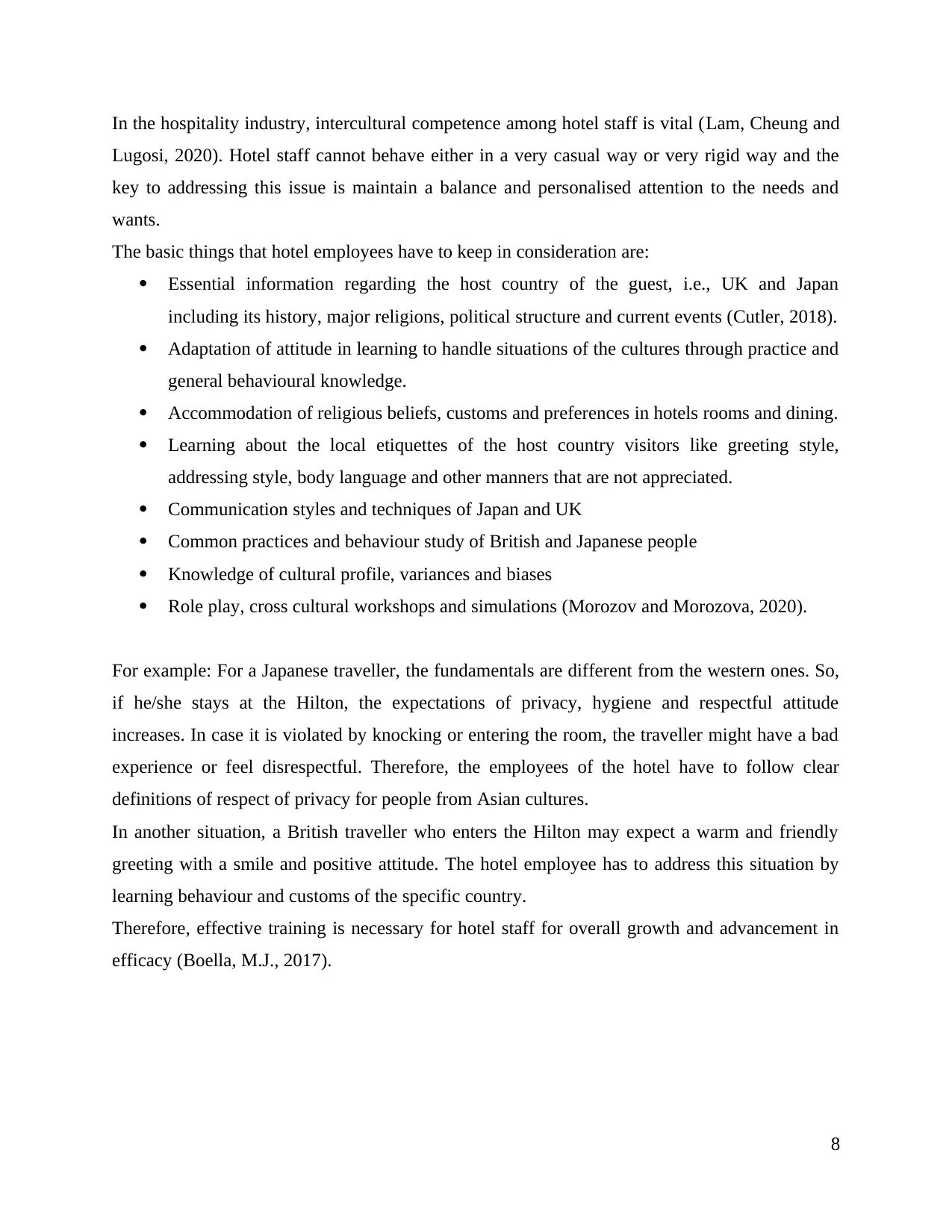
In the hospitality industry, intercultural competence among hotel staff is vital (Lam, Cheung and
Lugosi, 2020). Hotel staff cannot behave either in a very casual way or very rigid way and the
key to addressing this issue is maintain a balance and personalised attention to the needs and
wants.
The basic things that hotel employees have to keep in consideration are:
Essential information regarding the host country of the guest, i.e., UK and Japan
including its history, major religions, political structure and current events (Cutler, 2018).
Adaptation of attitude in learning to handle situations of the cultures through practice and
general behavioural knowledge.
Accommodation of religious beliefs, customs and preferences in hotels rooms and dining.
Learning about the local etiquettes of the host country visitors like greeting style,
addressing style, body language and other manners that are not appreciated.
Communication styles and techniques of Japan and UK
Common practices and behaviour study of British and Japanese people
Knowledge of cultural profile, variances and biases
Role play, cross cultural workshops and simulations (Morozov and Morozova, 2020).
For example: For a Japanese traveller, the fundamentals are different from the western ones. So,
if he/she stays at the Hilton, the expectations of privacy, hygiene and respectful attitude
increases. In case it is violated by knocking or entering the room, the traveller might have a bad
experience or feel disrespectful. Therefore, the employees of the hotel have to follow clear
definitions of respect of privacy for people from Asian cultures.
In another situation, a British traveller who enters the Hilton may expect a warm and friendly
greeting with a smile and positive attitude. The hotel employee has to address this situation by
learning behaviour and customs of the specific country.
Therefore, effective training is necessary for hotel staff for overall growth and advancement in
efficacy (Boella, M.J., 2017).
8
Lugosi, 2020). Hotel staff cannot behave either in a very casual way or very rigid way and the
key to addressing this issue is maintain a balance and personalised attention to the needs and
wants.
The basic things that hotel employees have to keep in consideration are:
Essential information regarding the host country of the guest, i.e., UK and Japan
including its history, major religions, political structure and current events (Cutler, 2018).
Adaptation of attitude in learning to handle situations of the cultures through practice and
general behavioural knowledge.
Accommodation of religious beliefs, customs and preferences in hotels rooms and dining.
Learning about the local etiquettes of the host country visitors like greeting style,
addressing style, body language and other manners that are not appreciated.
Communication styles and techniques of Japan and UK
Common practices and behaviour study of British and Japanese people
Knowledge of cultural profile, variances and biases
Role play, cross cultural workshops and simulations (Morozov and Morozova, 2020).
For example: For a Japanese traveller, the fundamentals are different from the western ones. So,
if he/she stays at the Hilton, the expectations of privacy, hygiene and respectful attitude
increases. In case it is violated by knocking or entering the room, the traveller might have a bad
experience or feel disrespectful. Therefore, the employees of the hotel have to follow clear
definitions of respect of privacy for people from Asian cultures.
In another situation, a British traveller who enters the Hilton may expect a warm and friendly
greeting with a smile and positive attitude. The hotel employee has to address this situation by
learning behaviour and customs of the specific country.
Therefore, effective training is necessary for hotel staff for overall growth and advancement in
efficacy (Boella, M.J., 2017).
8
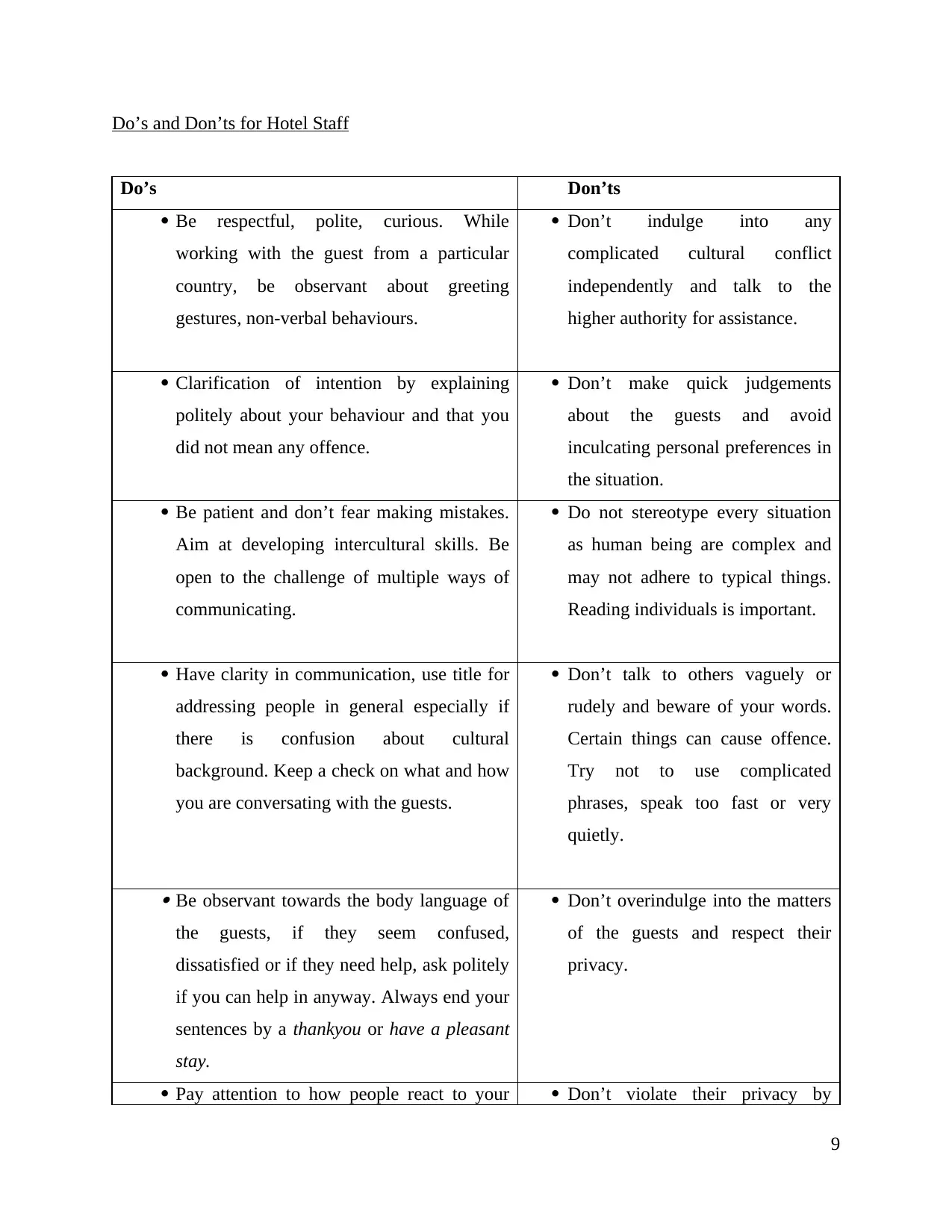
Do’s and Don’ts for Hotel Staff
Do’s Don’ts
Be respectful, polite, curious. While
working with the guest from a particular
country, be observant about greeting
gestures, non-verbal behaviours.
Don’t indulge into any
complicated cultural conflict
independently and talk to the
higher authority for assistance.
Clarification of intention by explaining
politely about your behaviour and that you
did not mean any offence.
Don’t make quick judgements
about the guests and avoid
inculcating personal preferences in
the situation.
Be patient and don’t fear making mistakes.
Aim at developing intercultural skills. Be
open to the challenge of multiple ways of
communicating.
Do not stereotype every situation
as human being are complex and
may not adhere to typical things.
Reading individuals is important.
Have clarity in communication, use title for
addressing people in general especially if
there is confusion about cultural
background. Keep a check on what and how
you are conversating with the guests.
Don’t talk to others vaguely or
rudely and beware of your words.
Certain things can cause offence.
Try not to use complicated
phrases, speak too fast or very
quietly.
Be observant towards the body language of
the guests, if they seem confused,
dissatisfied or if they need help, ask politely
if you can help in anyway. Always end your
sentences by a thankyou or have a pleasant
stay.
Don’t overindulge into the matters
of the guests and respect their
privacy.
Pay attention to how people react to your Don’t violate their privacy by
9
Do’s Don’ts
Be respectful, polite, curious. While
working with the guest from a particular
country, be observant about greeting
gestures, non-verbal behaviours.
Don’t indulge into any
complicated cultural conflict
independently and talk to the
higher authority for assistance.
Clarification of intention by explaining
politely about your behaviour and that you
did not mean any offence.
Don’t make quick judgements
about the guests and avoid
inculcating personal preferences in
the situation.
Be patient and don’t fear making mistakes.
Aim at developing intercultural skills. Be
open to the challenge of multiple ways of
communicating.
Do not stereotype every situation
as human being are complex and
may not adhere to typical things.
Reading individuals is important.
Have clarity in communication, use title for
addressing people in general especially if
there is confusion about cultural
background. Keep a check on what and how
you are conversating with the guests.
Don’t talk to others vaguely or
rudely and beware of your words.
Certain things can cause offence.
Try not to use complicated
phrases, speak too fast or very
quietly.
Be observant towards the body language of
the guests, if they seem confused,
dissatisfied or if they need help, ask politely
if you can help in anyway. Always end your
sentences by a thankyou or have a pleasant
stay.
Don’t overindulge into the matters
of the guests and respect their
privacy.
Pay attention to how people react to your Don’t violate their privacy by
9
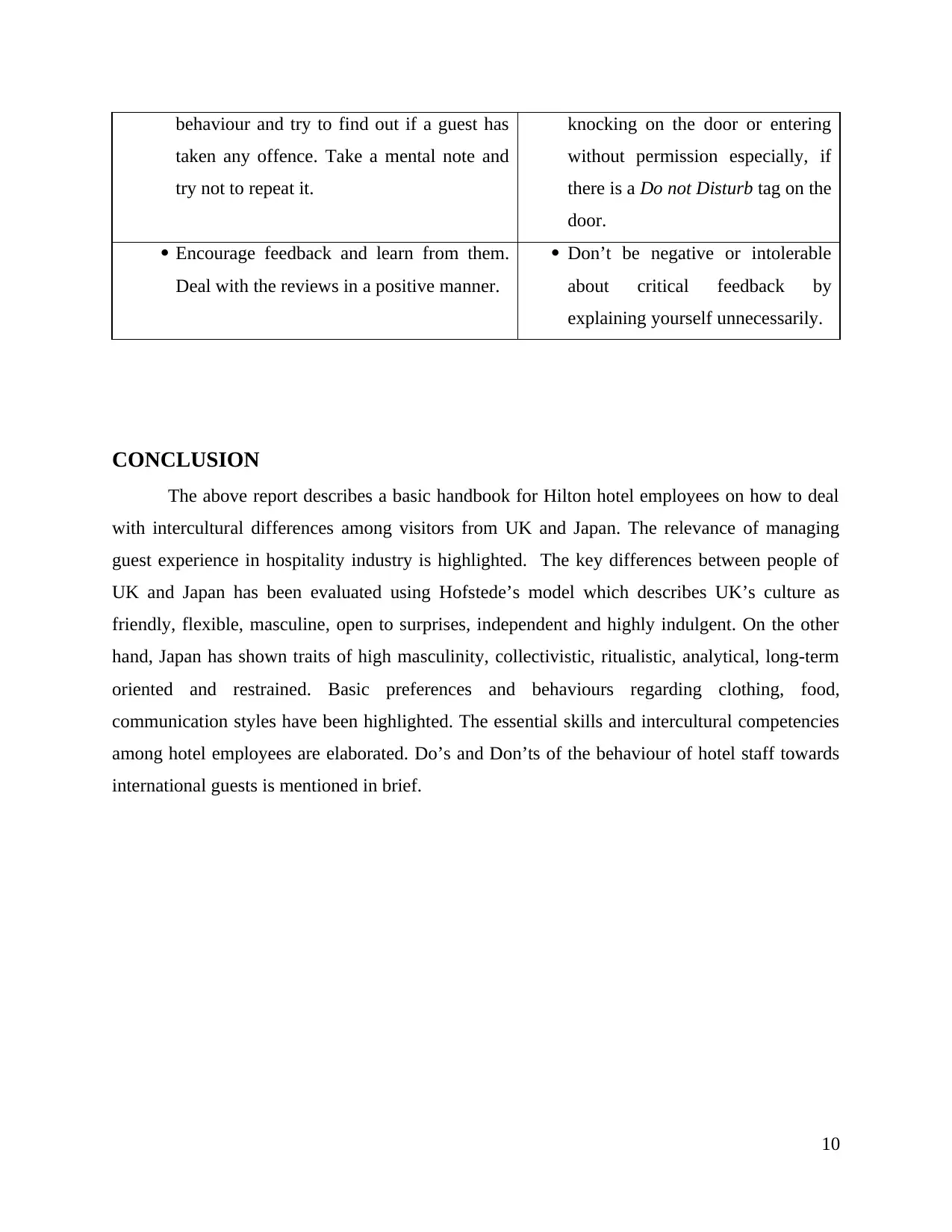
behaviour and try to find out if a guest has
taken any offence. Take a mental note and
try not to repeat it.
knocking on the door or entering
without permission especially, if
there is a Do not Disturb tag on the
door.
Encourage feedback and learn from them.
Deal with the reviews in a positive manner.
Don’t be negative or intolerable
about critical feedback by
explaining yourself unnecessarily.
CONCLUSION
The above report describes a basic handbook for Hilton hotel employees on how to deal
with intercultural differences among visitors from UK and Japan. The relevance of managing
guest experience in hospitality industry is highlighted. The key differences between people of
UK and Japan has been evaluated using Hofstede’s model which describes UK’s culture as
friendly, flexible, masculine, open to surprises, independent and highly indulgent. On the other
hand, Japan has shown traits of high masculinity, collectivistic, ritualistic, analytical, long-term
oriented and restrained. Basic preferences and behaviours regarding clothing, food,
communication styles have been highlighted. The essential skills and intercultural competencies
among hotel employees are elaborated. Do’s and Don’ts of the behaviour of hotel staff towards
international guests is mentioned in brief.
10
taken any offence. Take a mental note and
try not to repeat it.
knocking on the door or entering
without permission especially, if
there is a Do not Disturb tag on the
door.
Encourage feedback and learn from them.
Deal with the reviews in a positive manner.
Don’t be negative or intolerable
about critical feedback by
explaining yourself unnecessarily.
CONCLUSION
The above report describes a basic handbook for Hilton hotel employees on how to deal
with intercultural differences among visitors from UK and Japan. The relevance of managing
guest experience in hospitality industry is highlighted. The key differences between people of
UK and Japan has been evaluated using Hofstede’s model which describes UK’s culture as
friendly, flexible, masculine, open to surprises, independent and highly indulgent. On the other
hand, Japan has shown traits of high masculinity, collectivistic, ritualistic, analytical, long-term
oriented and restrained. Basic preferences and behaviours regarding clothing, food,
communication styles have been highlighted. The essential skills and intercultural competencies
among hotel employees are elaborated. Do’s and Don’ts of the behaviour of hotel staff towards
international guests is mentioned in brief.
10
Secure Best Marks with AI Grader
Need help grading? Try our AI Grader for instant feedback on your assignments.
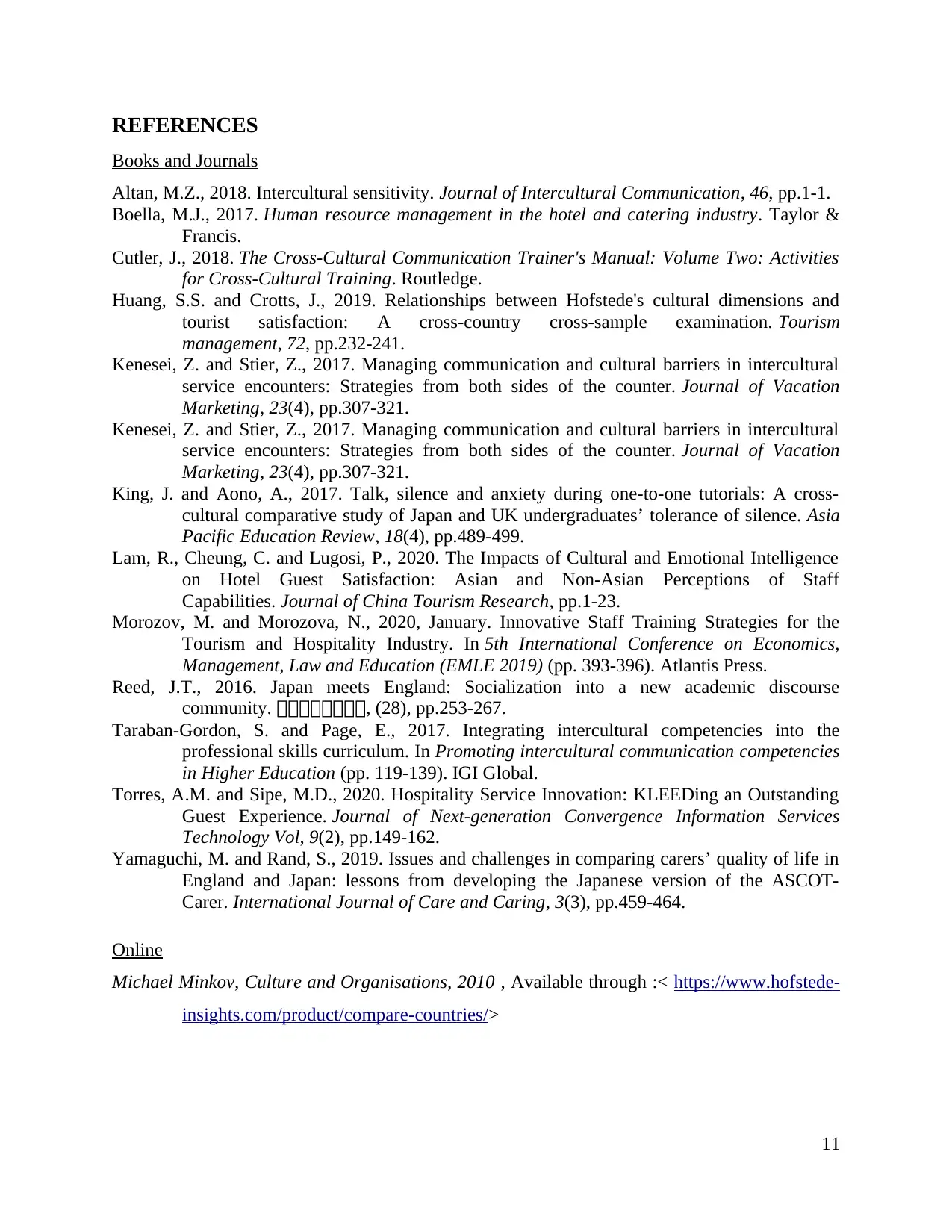
REFERENCES
Books and Journals
Altan, M.Z., 2018. Intercultural sensitivity. Journal of Intercultural Communication, 46, pp.1-1.
Boella, M.J., 2017. Human resource management in the hotel and catering industry. Taylor &
Francis.
Cutler, J., 2018. The Cross-Cultural Communication Trainer's Manual: Volume Two: Activities
for Cross-Cultural Training. Routledge.
Huang, S.S. and Crotts, J., 2019. Relationships between Hofstede's cultural dimensions and
tourist satisfaction: A cross-country cross-sample examination. Tourism
management, 72, pp.232-241.
Kenesei, Z. and Stier, Z., 2017. Managing communication and cultural barriers in intercultural
service encounters: Strategies from both sides of the counter. Journal of Vacation
Marketing, 23(4), pp.307-321.
Kenesei, Z. and Stier, Z., 2017. Managing communication and cultural barriers in intercultural
service encounters: Strategies from both sides of the counter. Journal of Vacation
Marketing, 23(4), pp.307-321.
King, J. and Aono, A., 2017. Talk, silence and anxiety during one-to-one tutorials: A cross-
cultural comparative study of Japan and UK undergraduates’ tolerance of silence. Asia
Pacific Education Review, 18(4), pp.489-499.
Lam, R., Cheung, C. and Lugosi, P., 2020. The Impacts of Cultural and Emotional Intelligence
on Hotel Guest Satisfaction: Asian and Non-Asian Perceptions of Staff
Capabilities. Journal of China Tourism Research, pp.1-23.
Morozov, M. and Morozova, N., 2020, January. Innovative Staff Training Strategies for the
Tourism and Hospitality Industry. In 5th International Conference on Economics,
Management, Law and Education (EMLE 2019) (pp. 393-396). Atlantis Press.
Reed, J.T., 2016. Japan meets England: Socialization into a new academic discourse
community. 神神神神神神神神, (28), pp.253-267.
Taraban-Gordon, S. and Page, E., 2017. Integrating intercultural competencies into the
professional skills curriculum. In Promoting intercultural communication competencies
in Higher Education (pp. 119-139). IGI Global.
Torres, A.M. and Sipe, M.D., 2020. Hospitality Service Innovation: KLEEDing an Outstanding
Guest Experience. Journal of Next-generation Convergence Information Services
Technology Vol, 9(2), pp.149-162.
Yamaguchi, M. and Rand, S., 2019. Issues and challenges in comparing carers’ quality of life in
England and Japan: lessons from developing the Japanese version of the ASCOT-
Carer. International Journal of Care and Caring, 3(3), pp.459-464.
Online
Michael Minkov, Culture and Organisations, 2010 , Available through :< https://www.hofstede-
insights.com/product/compare-countries/>
11
Books and Journals
Altan, M.Z., 2018. Intercultural sensitivity. Journal of Intercultural Communication, 46, pp.1-1.
Boella, M.J., 2017. Human resource management in the hotel and catering industry. Taylor &
Francis.
Cutler, J., 2018. The Cross-Cultural Communication Trainer's Manual: Volume Two: Activities
for Cross-Cultural Training. Routledge.
Huang, S.S. and Crotts, J., 2019. Relationships between Hofstede's cultural dimensions and
tourist satisfaction: A cross-country cross-sample examination. Tourism
management, 72, pp.232-241.
Kenesei, Z. and Stier, Z., 2017. Managing communication and cultural barriers in intercultural
service encounters: Strategies from both sides of the counter. Journal of Vacation
Marketing, 23(4), pp.307-321.
Kenesei, Z. and Stier, Z., 2017. Managing communication and cultural barriers in intercultural
service encounters: Strategies from both sides of the counter. Journal of Vacation
Marketing, 23(4), pp.307-321.
King, J. and Aono, A., 2017. Talk, silence and anxiety during one-to-one tutorials: A cross-
cultural comparative study of Japan and UK undergraduates’ tolerance of silence. Asia
Pacific Education Review, 18(4), pp.489-499.
Lam, R., Cheung, C. and Lugosi, P., 2020. The Impacts of Cultural and Emotional Intelligence
on Hotel Guest Satisfaction: Asian and Non-Asian Perceptions of Staff
Capabilities. Journal of China Tourism Research, pp.1-23.
Morozov, M. and Morozova, N., 2020, January. Innovative Staff Training Strategies for the
Tourism and Hospitality Industry. In 5th International Conference on Economics,
Management, Law and Education (EMLE 2019) (pp. 393-396). Atlantis Press.
Reed, J.T., 2016. Japan meets England: Socialization into a new academic discourse
community. 神神神神神神神神, (28), pp.253-267.
Taraban-Gordon, S. and Page, E., 2017. Integrating intercultural competencies into the
professional skills curriculum. In Promoting intercultural communication competencies
in Higher Education (pp. 119-139). IGI Global.
Torres, A.M. and Sipe, M.D., 2020. Hospitality Service Innovation: KLEEDing an Outstanding
Guest Experience. Journal of Next-generation Convergence Information Services
Technology Vol, 9(2), pp.149-162.
Yamaguchi, M. and Rand, S., 2019. Issues and challenges in comparing carers’ quality of life in
England and Japan: lessons from developing the Japanese version of the ASCOT-
Carer. International Journal of Care and Caring, 3(3), pp.459-464.
Online
Michael Minkov, Culture and Organisations, 2010 , Available through :< https://www.hofstede-
insights.com/product/compare-countries/>
11
1 out of 11
Related Documents
Your All-in-One AI-Powered Toolkit for Academic Success.
+13062052269
info@desklib.com
Available 24*7 on WhatsApp / Email
![[object Object]](/_next/static/media/star-bottom.7253800d.svg)
Unlock your academic potential
© 2024 | Zucol Services PVT LTD | All rights reserved.





